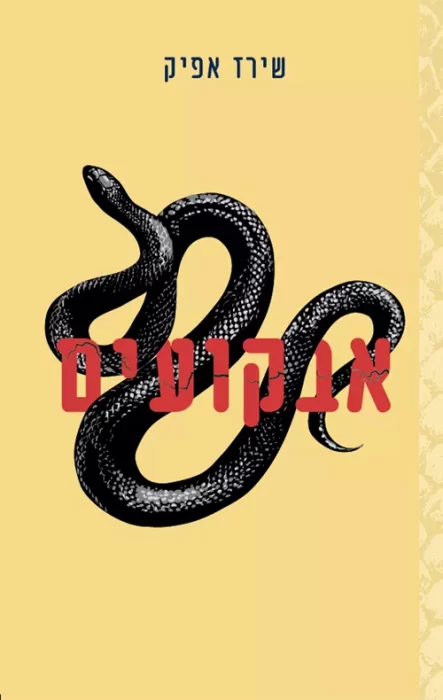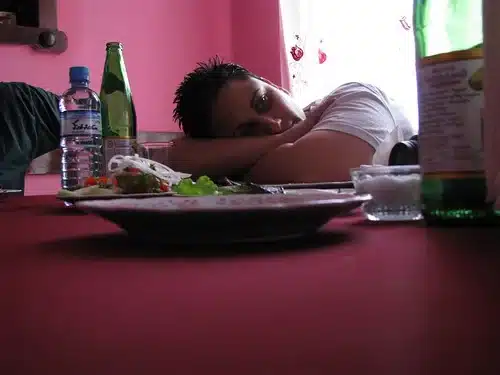Please scroll down for an English review.
הספר הראשון שאני קוראת מאת שירז אפיק ואין לי ספק מדובר בהפגנת יכולות מרשימה של סופרת מעניינת ומוכשרת.
הספר יצא בשנת 2019, והמתין לי. משהו בכריכה שלו מרתיע, אולי הנחש השחור על רקע צהוב (בכלל חייבת לציין שלא מבינה את הבחירה בצבע חרדלי לכריכה, למרות שההגיון ברור לי. אגב, גם בספר השני שלה, הכריכה בגוון צהוב ירקרק עושה לי חררה) אולי דווקא שם הספר גרם לרגש הדחיינות שהרגשתי שמציף אותי בכל פעם שבאתי לקרוא אותו. שהתגברתי על המחסומים הפסיכולוגיים שלי והצלחתי להתחיל לקרוא אותו, כמה נדהמתי שהוא לא זכה לתהודה רחבה יותר.
סיפורו של בועז, ג'ומעה, שגדל עם אמו במושב שכוח אל. אביו הוא דמות נעלמת שאין מדברים בה ולמרות ניסיונותיו לאורך השנים אימו לא גילתה לו את הסוד הנצור.
לאחר שבצעירותו נחש הכיש אותו, ובהזיותיו הוא רואה את עצמו כמעיין סנייקמן הוא מפתח חיבת יתר לנחשים. כשהוא גדל, הוא הופך את אהבתו למקצוע ונהיה לוכד הנחשים מספר אחת.
בועז טיפוס מתבודד, חובב טבע ואתאיסט גמור. הוא ציני בהתייחסות שלו לבני אדם ובעיקר לנשים שנמשכות לכריזמה שלו כמו פרפר לאש. הציניות היא תוצר של אמא עסוקה מידי בטרדות הפרנסה, אבל גם של מפגשים חסרי תקווה עם המורה שלו לתנ"ך בבית הספר:
"התעוררתי רק כשבוכבינדר סגר בטריקה את הספר שלו. הוא פנה אל אמא שעמדה בפתח המטבח, בלי לזכות אותי במבט. "מצטער מאוד," אמר בקול שלא היה בו צער, רק חומרה. "ניסיתי להגיד לך את זה קודם ולא הקשבת. הילד מטומטם.""הילד שלי לא מטומטם," אמרה אמא, ועכשיו גם בעיניים שלה הבריק אור מסוכן. "הרעיון של הבר מצווה היה מטומטם. להזמין אותך לפה היה מטומטם!""
הסיפור של בועז הוא סיפור משפחתי וחברתי. הוא מתאר את ההתמודדות של הילד ואימו עם היחס של הסביבה במושב קטן וסגור, אל הילד שאימו החד הורית עסוקה בפרנסה והוא בוחר לבלות את זמנו החופשי בטבע. אבל הוא לא רק סיפור משפחתי.
על סיפור המשפחתי נוסף רובד מותח כאשר באמצע שנות השלושים של בועז, הוא פוגש את מי שטוען להיות בנו. בועז אינו דוחה את הילד ואינו מקבל אותו, הוא מתייחס אליו כאל אחד האדם, בציניות המפוקחת הטבועה בו. מה שמוליד סיטואציות משעשעות אבל גם כאלה שחושפות את ההבדל הטבוע בין עצמאי ותפקודי, לבין נגרר. בלב הדרמה של הסיפור המשפחתי הזה, ניצב למעשה האדם כייצור בודד.
דרך הסיפור מאפשרת לקורא להשוות בין בועז לילד מעיניו הבוגרות של בועז. גם הילד גדל עם אם חד הורית ובניגוד לבועז שלומד עצמאות, שרידות ונחמה בגידול הנחשים שלו, הילד מקבל צביון של שלומיאל, פתי וחסר יכולת להסתדר בג'ונגל של החיים.
לנחשים יש חלק מהותי בסיפור, לא אחשוף אותו על מנת שלא לספיילר. ספר טוב מאוד רוצו לקרוא.
אבקועים/ שירז אפיק
הוצאת שממית, 2019, 195 עמ'
דירוג SIVI –
איכות אודיו –

This was the first book I read by Shiraz Afik, and I have no doubt it is an impressive demonstration of the abilities of an exciting and talented writer. The book, a blend of contemporary fiction and psychological drama, offers a unique reading experience.
The book was released in 2019, and it was waiting for me. Something about its cover is discouraging, perhaps the black snake on a yellow background (I must say that I don't understand the choice of mustard color for the cover, although the logic is clear to me. By the way, in her second book, the greenish-yellow cover also makes me cringe). Perhaps it was the title of the book that caused the feeling of procrastination that overwhelmed me every time I came to read it. I overcame my psychological barriers and managed to start reading it. I was amazed that it didn't resonate more widely.
This is the story of Boaz, Jumaa, who grew up with his mother in a Moshav forsaken by God. His father is a disappearing figure who is not spoken about, and despite his attempts over the years, his mother does not reveal the secret to him.
After a snake bit him in his youth, and he sees himself as the Snakeman in his delusions, he develops an excessive fondness for snakes. As he grows up, he turns his love into a profession and becomes the number one snake catcher.
Boaz, a loner and a complete atheist, is unwavering in his disbelief. His cynicism, a product of his mother's preoccupation with making a living and his disillusioning encounters with his Bible teacher at school, is a testament to his strong disbelief in the divine.
Boaz's story is not just about his journey but also a poignant exploration of family and social dynamics. It resonates with the struggles of a single mother and a boy who finds solace in nature, making it a profoundly empathetic and relatable read.
An exciting layer is added to the family story when, in Boaz's mid-thirties, he meets someone who claims to be his son. Boaz neither rejects nor accepts the child; he treats him as one of the people, with the controlled cynicism inherent in him. This gives rise to amusing situations that bring a lighter tone to the narrative and reveal the intrinsic difference between independent and functional and a follower. At the heart of the drama of this family story stands the fact that man is a solitary creature.
The story's narrative structure allows the reader to compare Boaz with the child, seen through Boaz's adult eyes. Single mothers raise Boaz and the child, yet their paths diverge significantly. Boaz learns independence, comfort, and crucial survival skills through his unique upbringing with snakes. In contrast, the child, who embodies the character of Shlumiel, is portrayed as gullible and ill-equipped to navigate life's challenges.
The snakes play a crucial role in the story, serving as a metaphor for Boaz's life and his relationships. However, I won't share more to avoid spoilers. This book is a must-read if you're intrigued by this unique narrative element.
לגלות עוד מהאתר Sivi's Books
Subscribe to get the latest posts sent to your email.

